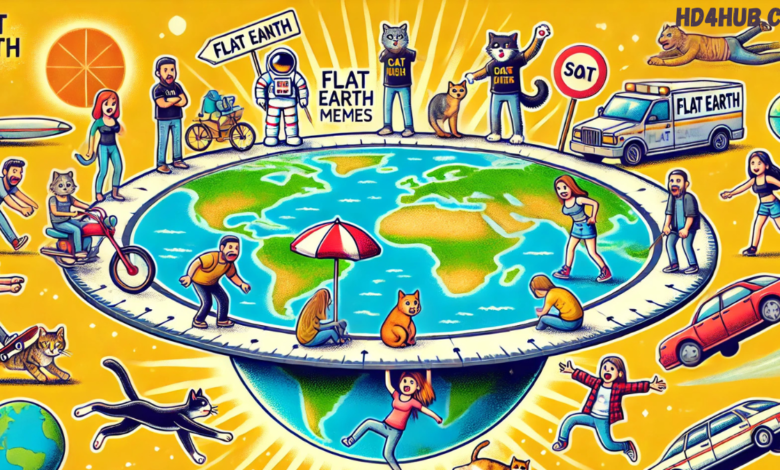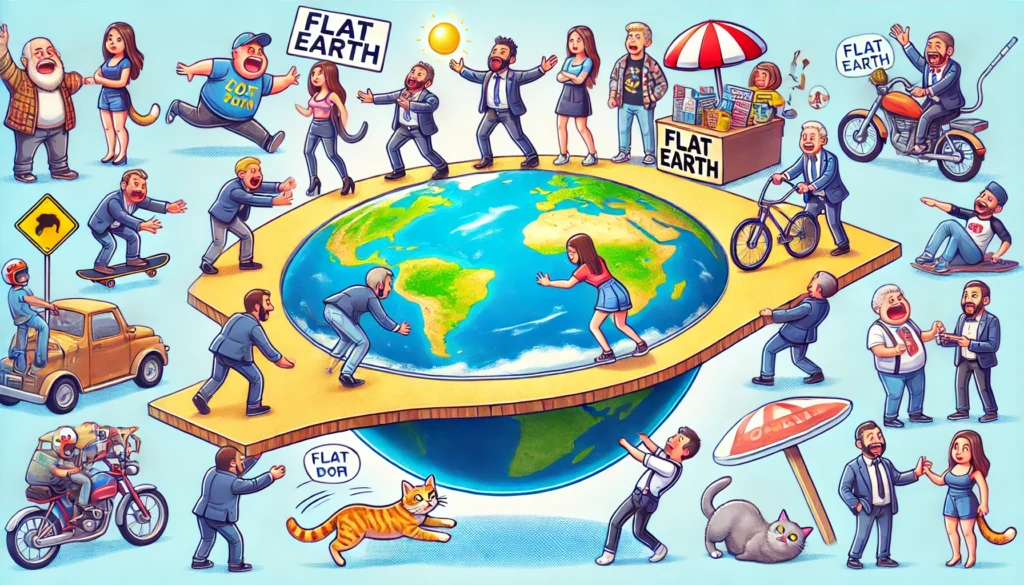Flat-Out Funny Exploring the Hilarious World of Flat Earth Memes

Introduction
The Flat Earth Memes theory, an assertion that Earth is flat rather than spherical, has transformed from a fringe conspiracy into a viral internet sensation, thanks largely to memes. Memes, humorous images, or videos widely shared across social platforms, Flat Earth Memes comedy with cultural commentary. Flat Earth memes uniquely sit at the crossroads of humor and controversy, making light of claims that directly challenge centuries of scientific consensus. Their appeal lies not only in their comedic value but also in their ability to succinctly encapsulate complex dialogues about misinformation, skepticism, and public discourse.
As internet culture thrives on irony and satire, Flat Earth memes resonate profoundly. They capitalize on the absurdity inherent in modern conspiracy theories, simultaneously entertaining and informing audiences. These memes have proliferated rapidly on platforms like Reddit, Instagram, Facebook, and TikTok, helping bridge the gap between genuine scientific inquiry and playful skepticism. Their prevalence illustrates society’s fascination with questioning and humorously dissecting unconventional ideas, often sparking broader conversations about science literacy and the role of humor in critical thinking.
The Origins of Flat Earth Memes
The revival of Flat Earth theory in contemporary digital culture can largely be credited to the rise of social media. Platforms such as YouTube and Reddit played pivotal roles by giving conspiracy theorists unprecedented reach. Initially, content promoting Flat Earth theory was presented earnestly, attempting to persuade viewers using pseudo-scientific arguments. However, as awareness of these ideas grew, creators quickly recognized a ripe opportunity for humor and satire.
Early Flat Earth memes served as responses to absurd conspiracy claims, highlighting flawed logic with wit and sarcasm. Memes such as “If the Earth was flat, cats would have knocked everything off by now,” gained viral traction for their humorous simplicity and effective debunking power. These initial memes laid the groundwork for more sophisticated iterations, incorporating imagery and references that resonated with both supporters and skeptics alike.
The explosion of Flat Earth memes illustrates how humor can transform public perception of controversial ideas. Rather than solely attacking believers, memes provided an accessible way for people to understand and discuss complex issues. Over time, these memes evolved, becoming integral to online culture and shaping public conversations around misinformation and critical thinking.
Common Themes in Flat Earth Memes
Visual humor remains central to the appeal of Flat Earth memes. Commonly, Earth is depicted as a flat disc or plate, humorously exaggerating the Flat Earth claim. Images frequently feature characters or scenarios humorously “falling off” the edge of the Earth, often integrating popular culture references or familiar meme templates. For instance, memes parodying famous films, such as “Pirates of the Caribbean,” humorously imagine characters discovering the Earth’s edge. These visual jokes succinctly encapsulate the inherent absurdity of Flat Earth beliefs, making complex ideas easily digestible and entertaining.
Sarcasm and irony also heavily influence Flat Earth memes. Creators mock the pseudo-scientific arguments presented by Flat Earthers, highlighting logical inconsistencies and absurdities through exaggerated humor. Memes frequently feature overly simplified scientific rebuttals or deliberately absurd scenarios to highlight the irrationality of conspiracy thinking. For example, a popular meme states: “If Earth was flat, there would be no gravity, only stupidity holding us down,” cleverly blending sarcasm with scientific reality.
Pop culture references further enrich Flat Earth memes by enhancing relatability and entertainment value. By drawing from popular movies, TV shows, and existing meme formats, creators ensure their memes resonate widely. Such crossovers help memes transcend niche audiences, encouraging broader discussions about misinformation and rational thinking.
The Psychology Behind Flat Earth Memes

Flat Earth memes are captivating because they tap into universal psychological principles such as humor’s ability to foster group cohesion and in-group identity. When users share or engage with these memes, they signal their belonging to a community that values science, rational thought, or simply enjoys humorous content. Humor acts as a social bonding mechanism, creating connections through shared enjoyment of satire and ridicule directed at irrational beliefs.
Memes also serve as accessible entry points for individuals who might not otherwise engage with scientific debates. Their simplistic, humorous nature lowers cognitive barriers, encouraging users to consider arguments they might normally avoid. This accessibility can stimulate critical thinking, prompting audiences to question why certain beliefs, like Flat Earth theory, persist despite overwhelming scientific evidence. By humorously illustrating logical fallacies, memes encourage skepticism and rational inquiry.
However, humor can be a double-edged sword. While memes predominantly mock conspiracy theories, there’s a risk of inadvertently amplifying these fringe beliefs. When memes go viral, they increase awareness of the conspiracy itself, potentially reinforcing ideas through repetition or exposure. This phenomenon underscores the complex interplay between humor, misinformation, and online behavior, highlighting the necessity of thoughtful engagement even within humorous contexts.
The Impact and Controversy of Flat Earth Memes
Flat Earth memes have undeniably influenced online discourse around conspiracy theories, often serving as effective tools for debunking misinformation. Through humor, creators highlight factual inaccuracies and logical fallacies within Flat Earth arguments, encouraging audiences to critically assess these ideas. Anecdotally, many internet users claim that encountering memes contributed to their understanding of scientific concepts and skepticism toward misinformation.
Conversely, some argue that memes trivialize serious issues, potentially alienating individuals genuinely seeking answers. Flat Earth communities frequently perceive memes as dismissive attacks rather than constructive criticisms, creating defensive attitudes rather than open dialogues. Such dynamics illustrate the challenge of using humor responsibly in public conversations about misinformation and science literacy.
Ultimately, Flat Earth memes represent a broader societal trend toward humorous engagement with controversial topics. While their influence remains mixed, the enduring popularity and controversy surrounding these memes demonstrate humor’s significant role in shaping public opinion, attitudes toward science, and the ongoing struggle against misinformation.
Conclusion
Flat Earth memes have transcended their initial comedic intent to become powerful cultural phenomena, shaping public conversations about conspiracy theories and misinformation. By humorously exposing logical fallacies and absurdities, they serve as valuable educational tools, yet carry inherent risks of amplifying fringe ideas. As digital culture continues evolving, the role of memes in public discourse is likely to grow, highlighting humor’s ongoing significance in both entertainment and critical engagement.
You May Also Read: https://hd4hub.co.uk/
